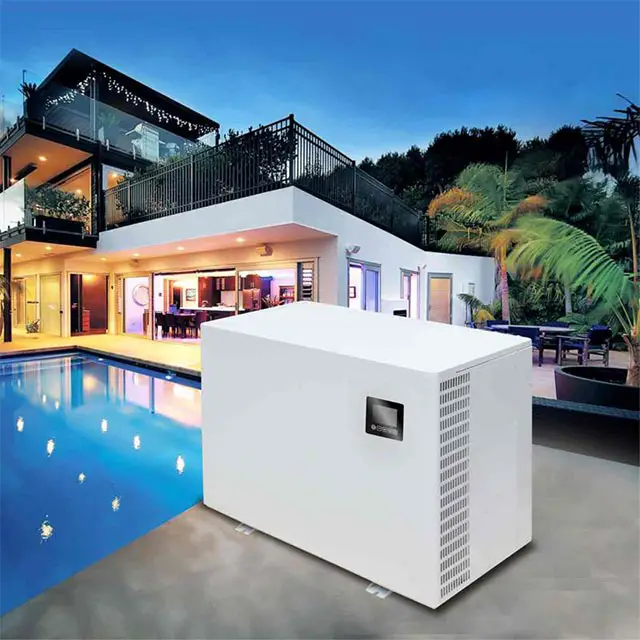It can take anywhere from several hours to a few days to heat a pool, depending on the size and the type of heating system used. A pool is a luxurious addition to any backyard, providing a refreshing retreat on those hot summer days.
But enjoying a dip in the pool often requires some initial patience as it can take a certain amount of time to heat the water to a comfortable temperature. The length of time it takes to heat a pool can vary depending on a few factors.
The size of the pool, the type of heating system being used, and the current temperature of the water all play a role in determining the heating time. We will explore how long it typically takes to heat a pool and some tips for reducing heating time so you can start splashing around sooner.

Credit: www.inyopools.com
Factors Affecting Pool Heating Time
Size Of The Pool
Pool heating time can vary based on the size of the pool. Larger pools will generally require more time to heat up compared to smaller ones.
Ambient Temperature
The ambient temperature surrounding the pool plays a crucial role in determining the time it takes to heat the pool. Warmer ambient temperatures can expedite the heating process.

Credit: www.inyopools.com
Types Of Pool Heaters
When considering the most suitable pool heating option, it’s essential to understand the various types of pool heaters available. Each type of pool heater operates differently and comes with its own set of advantages and drawbacks. The three main types of pool heaters include:
Solar Pool Heaters
Solar pool heaters harness energy from the sun to gradually warm up the water in your pool. These eco-friendly heating systems are cost-effective in the long run but may have higher initial installation costs.
Gas Pool Heaters
Gas pool heaters, which utilize either natural gas or propane, heat up the water in your pool rapidly. While they are quick and efficient, gas pool heaters can be more costly to operate compared to other options, especially if gas prices fluctuate.
Electric Pool Heaters
Electric pool heaters are powered by electricity and are ideal for maintaining a consistent temperature in your pool. Though they may have lower upfront costs and can be efficient, electric pool heaters tend to be more expensive to operate over time due to electricity rates.
When choosing a pool heater, consider factors such as your budget, climate, and desired heating speed to determine which type best suits your needs.
Optimizing Pool Heating Efficiency
When it comes to enjoying your pool throughout the year, optimizing pool heating efficiency is crucial. Not only does efficient heating ensure comfortable swimming conditions, but it also helps to reduce energy costs. In this section, we will discuss two key factors that play a significant role in optimizing pool heating efficiency: effective use of pool covers and regular maintenance of the heater.
Effective Use Of Pool Covers
Pool covers are a cost-effective solution to prevent heat loss and evaporation of water. By using a pool cover when the pool is not in use, you can retain heat and reduce the load on your pool heater. Here are a few important points to keep in mind:
- Always cover your pool when it is not being used.
- Choose a pool cover that is specifically designed to retain heat, such as a solar cover.
- Ensure the pool cover fits snugly over the pool, leaving no gaps for heat to escape.
- Remove the cover only when you are ready to use the pool and cover it back immediately when you are done.
Regular Maintenance Of Heater
Maintaining your pool heater is crucial to ensure optimal performance and efficiency. Follow these maintenance tips to keep your pool heater operating at its best:
- Schedule regular inspections and maintenance by a professional technician.
- Keep the heater area clean and free from debris to avoid any obstructions.
- Regularly check and clean the filters, ensuring proper water flow.
- Monitor the thermostat and adjust the temperature only as needed, avoiding unnecessarily high temperatures.
- Consider installing a pool heater cover to protect it from the elements and extend its lifespan.
By adhering to these practices, you can maximize pool heating efficiency, prolong the life of your heater, and enjoy a comfortable pool all year round.
Alternative Methods For Rapid Pool Heating
Looking for alternative methods to rapidly heat your pool? When it comes to heating your pool quickly, there are various techniques to consider. Heat pumps and pool heat exchangers are two powerful methods that can swiftly warm your pool water, allowing you to enjoy a comfortable swimming experience in no time.
Heat Pumps
Heat pumps are an efficient way to heat your pool rapidly. They work by extracting heat from the air and transferring it to the pool water. This method is energy-efficient and cost-effective, providing quick results for heating your pool, especially in warmer climates. With their ability to generate heat regardless of external temperatures, heat pumps can swiftly raise the temperature of your pool water, ensuring a pleasant swimming experience. learn How Much Does It Cost to Heat a Pool
Using Pool Heat Exchangers
Pool heat exchangers are an excellent alternative to quickly heating your pool water. These devices utilize your existing boiler system to transfer heat from the boiler to the pool water, rapidly raising its temperature. Pool heat exchangers are known for their efficiency and ability to provide rapid heating, making them an ideal choice for swiftly warming your pool, whether it’s for a special event or simply to extend your swimming season.
Technology Advancements In Pool Heating
Technology advancements in pool heating have revolutionized the way pool owners can efficiently heat their pools. With the introduction of smart pool heating systems and energy-efficient heater options, pool owners can now enjoy faster and more cost-effective pool heating solutions.
Smart Pool Heating Systems
Smart pool heating systems have transformed the pool heating experience by allowing users to control and monitor their pool temperature remotely. These systems are equipped with advanced sensors and automated controls, enabling precise temperature regulation and energy conservation. With the integration of smart technology, pool heating has become more convenient and efficient, providing users with the flexibility to manage their pool heating preferences from anywhere.
Energy-efficient Heater Options
Energy-efficient heater options have emerged as a sustainable and economical choice for pool heating. Modern heat pump technologies utilize renewable energy sources such as the ambient air or geothermal heat, significantly reducing energy consumption and operating costs. Additionally, advancements in heater insulation and heating element design have enhanced thermal efficiency, ensuring quicker heating times and prolonged heat retention. With these energy-efficient options, pool owners can achieve optimal comfort and performance while minimizing environmental impact.

Credit: ssspoolheating.com.au
Conclusion
In determining how long it takes to heat a pool, factors like size and heating system play crucial roles. Whether using a heat pump or solar heater, understanding these elements is key. Remember, regular maintenance and monitoring of temperature are vital for efficient heating.
Enjoy your warm pool!





